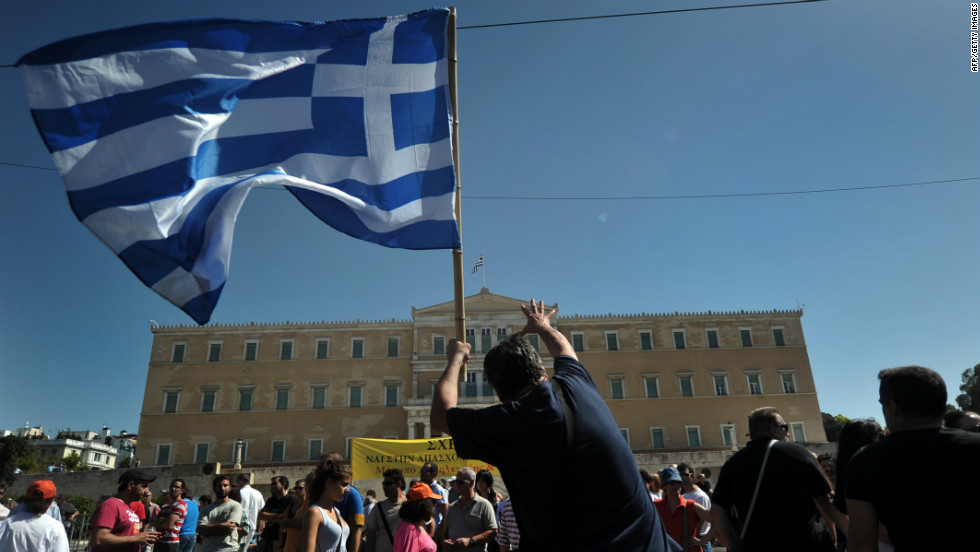For those of us who are not world class economists, the current Euro crisis can be a (tiny) bit confusing. From people rioting on the streets, to banks shutting down, and the Greek Prime Minister calling for a referendum on a question that no one really understands; everything is happening so fast that it has become almost impossible to keep up.
Back to the Start
In order to understand what is happening right now in Greece, it’s crucial to take a few steps back in time and understand the situation within the larger context of the Eurozone’s history.
The Euro was adopted as a common currency in 1999 by 11 countries. Today a total of 19 European countries use the euro as their national currency. Collectively, all these countries are part of a monetary union referred to as the Eurozone or Euro area. Such a union makes trading, borrowing and doing business across borders much easier. Moreover, because of these very same advantages, it makes its members extremely economically interdependent, which can be very dangerous at times of crisis.
Greece and the Eurozone
Greece joined the union in 2001 after seemingly meeting all the qualifications. However as former European Central Bank (ECB) chief economist, Otmar Issing , stated in an interview in 2011,”Greece cheated to get in” and in 2008 the Greek government openly admitted that it had been lying for a long time about its deficit that has only increased since it joined the Eurozone. Joining the Eurozone has skyrocketed its ability to borrow. This has been the case because under one monetary union, countries operate under one monetary policy.
Monetary policy regulates the amount of money in the economy through varying interest rates. As part of the Eurozone, countries can borrow from the ECB at very low interest rates allowing them to increase their borrowing and hence also as in Greece’s case, their spending. A major problem with the Eurozone is that although countries share one monetary policy, they operate under very different fiscal policies. In general, fiscal policies regulate spending and taxation. Greece opts for a more lenient fiscal policy; collecting little taxes and spending a lot. For a long time, Greece has been engaging in deficit spending, in other words spending from money that it doesn’t really have, money that is borrowed. Such spending is divided amongst several channels including high pensions, wages and old debt repayment.

The Crisis
When the 2008 financial crisis happened, and borrowing was no longer possible, Greece was in big trouble. Suddenly it was unable to finance the new jobs it had created, the high pensions it promised or the old debt that has been accumulating. In order to prevent an irreversible crisis in the EU region, the European Central Bank, the International Monetary Fund and the European Commission, collectively referred to as the Troika, offered to bailout Greece from its debt under certain austerity conditions. Austerity has to do with fiscal policy. It translates to cutting down spending and increasing taxation. This of course is an unwelcomed move. Although it is technically meant to help Greece eventually pay its debt and improve its economy on the long run, its effects are not immediate or guaranteed.
Such measures, in fact, often cause the opposite effect. As the government spends less, people earn less and consequently spend less, and overall less tax is collected. However, the rest of the EU believes austerity to be the best solution. Leading by example in terms of austerity, is Germany whose fear of inflation has caused it to diligently abide by strict fiscal policies.

Now
Over the years Greece failed to seriously put in effect such measures and according to the Troika, that has been the reason for its ever increasing debt. However as Egyptian economist Dr Medhat Nafei tells Egyptian Streets, “whether the tough measures were perfectly followed or partially followed is a debatable issue, but no one can ignore the fact that the Troika only serves models and hypotheses not the specific needs of the Greeks,” and hence completely complying to these conditions would have been and would be disastrous. Dr Nafei further argues that even the partial compliance of the last five years has had dire effects on Greece’s economy, almost directly causing youth unemployment to rise to up to 60%
Last Tuesday, Greece officially became the first European country to default on a crucial IMF debt primarily because the Troika refused to release the funding of a current bailout. The Troika refuses to then provide another, third bailout unless certain austerity measures are applied. These conditions include but are not limited to: increasing VAT rates, putting an end to tax avoidance while increasing certain tax rates and introducing new ones (such as taxation on television advertisements) and restructuring the pension system, by, for example, disincentivizing early retirement. Moreover the ECB has frozen all funds to Greek banks causing them to close all week and limit withdrawals to a maximum of 60 euros per day.

Referendum
Sunday night, before the IMF debt was due, Greek Prime Minister Alexis Tsipras called for a referendum on the conditions imposed by the Troika for their upcoming bailouts. The referendum question has been heavily criticized for being biased and unclear to regular citizens who are not economics experts.
The question is the following:
“Should the proposed agreement be accepted, which was submitted by the European Commission, the European Central Bank, and the International Monetary Fund in the Eurogroup of 25.06.2015 and consists of two parts, which constitute their unified proposal?
“The first document is entitled ‘Reforms for the Completion of the Current Program and Beyond’ and the second ‘Preliminary Debt Sustainability Analysis’.”
Next to the question are two boxes labeled Approved/ Yes and Not Approved/No. Not surprisingly the “No” box is above that of the “Yes”. On Wednesday, Tsipras gave a speech on Greek television urging his people to vote No. His bias is also not unusual. Tsipras is president of the radically leftist party Syriza, currently the largest party in the Greek Parliament, which promised back in January during elections to totally eliminate austerity measures. He hopes to use the referendum to strengthen Greece’s position in discussions with Eurozone leaders. Voting is to take place tomorrow on Sunday, the 5th of July.
Moreover, the documents mentioned above have not been translated to Greek and so are inaccessible to a large portion of the population. The European Commission also added that “neither this latest version of the document, nor an outline of a comprehensive deal could be formally finalized and presented to the Eurogroup due to the unilateral decision of the Greek authorities to abandon the process.” This means that the question above is irrelevant and invalid.

All discussions and talks have been put to a halt until the referendum takes place on Sunday. Although Tsipras vows that he does not have plans for a “Grexit”, in other words a Greek exit from the Eurozone, it seems very possible that this could be the inevitable if Greece votes “No”.
Professor Medhat speculates the outcome to be indeed “No”. However he does not believe that a Grexit is such a terrible idea.”Of course they are risking their very presence in the EU, neither the World Bank or, definitely, the IMF would offer any further help, but Greece will finally be able to “shape up” its own future, and I’m quoting Josef Stiglitz in these last words – voting “Yes” might take the country to a next harsh level of depression, with even higher rates of unemployment, severe youth immigration and God knows what dangerous limit of political instability.”
Although he does not deny the fact that Greek policy could use a little tightening he argues that the Troika’s conditions are unrealistic. He believes in a more customized solution that would be more relevant to people’s needs in Greece.
Agreeing with him Greek student Evi Koukorempa states, “this time we need mutual steps; a more human approach from the institutions and a more serious approach by Greece to tackle major issues, such as tax evasion and cleanup of the public sector, that nobody until now has had the guts to deal with.”

What does this mean for the rest of Europe?
Ultimately, Syriza – and the potential of a “no” vote on Sunday – represents far more than just monumental change for Greece. It represents a considerable challenge to the European status quo. Whilst the rejection of austerity does not necessarily mean a Greek exit from the Eurozone, it is certainly not unimaginable. Indeed, for many within the anti-austerity camp, including Syriza MP and professor of economics at the London School of Oriental and African Studies (SOAS) Costas Lapavitsas, the desire to fight austerity cannot take place within Europe. For Lapavitsas – who has been writing on the relationship between Greece and the rest of Europe for years – the primary alternative to austerity; debt relief, a sustained investment programme, a boost of aggregate demand, redistribution of income and wealth and structural reform of its economy is not viable within the Eurozone.

This leaves many potential outcomes – ranging from a successful Grexit and implementation of an alternative recovery model to austerity, to a tragic and long-drawn out capitulation of a seemingly conviction-led leftist party to the economically conventional demands of institutional giants. Should something akin to the latter happen, or if the Greeks vote in acceptance of austerity, this will represent a solidification of Troika hegemony and will be a huge blow to the anti-austerity movements rippling through Europe as a whole in their infancy. These movements are bubbling and range from the “Podemos” movement in Spain to the growing movement in UK, which saw a 250,000-strong anti-austerity march just earlier last month.
If something closer to the former happens however, this will represent a hugely compelling challenge to a system that has been largely unquestioned for years now, and it could have far reaching consequences that are hard to overstate. Indeed, one common concern expressed anonymously by European financial elites is not that Greece leaves Europe and fails, but rather that it leaves Europe and succeeds. Whatever the outcome ends up being, tomorrow all eyes will be on Greece, as we watch the country go through one of the most pivotal European elections of this century.
Co-authored by Dalia Gebrial






Comments (2)
[…] in today. He said that years of corruption have taken their toll on Greece leading to today’s Greek crisis, and that the current government is determined to end it. He called for support from other EU […]
Excellent coverage.